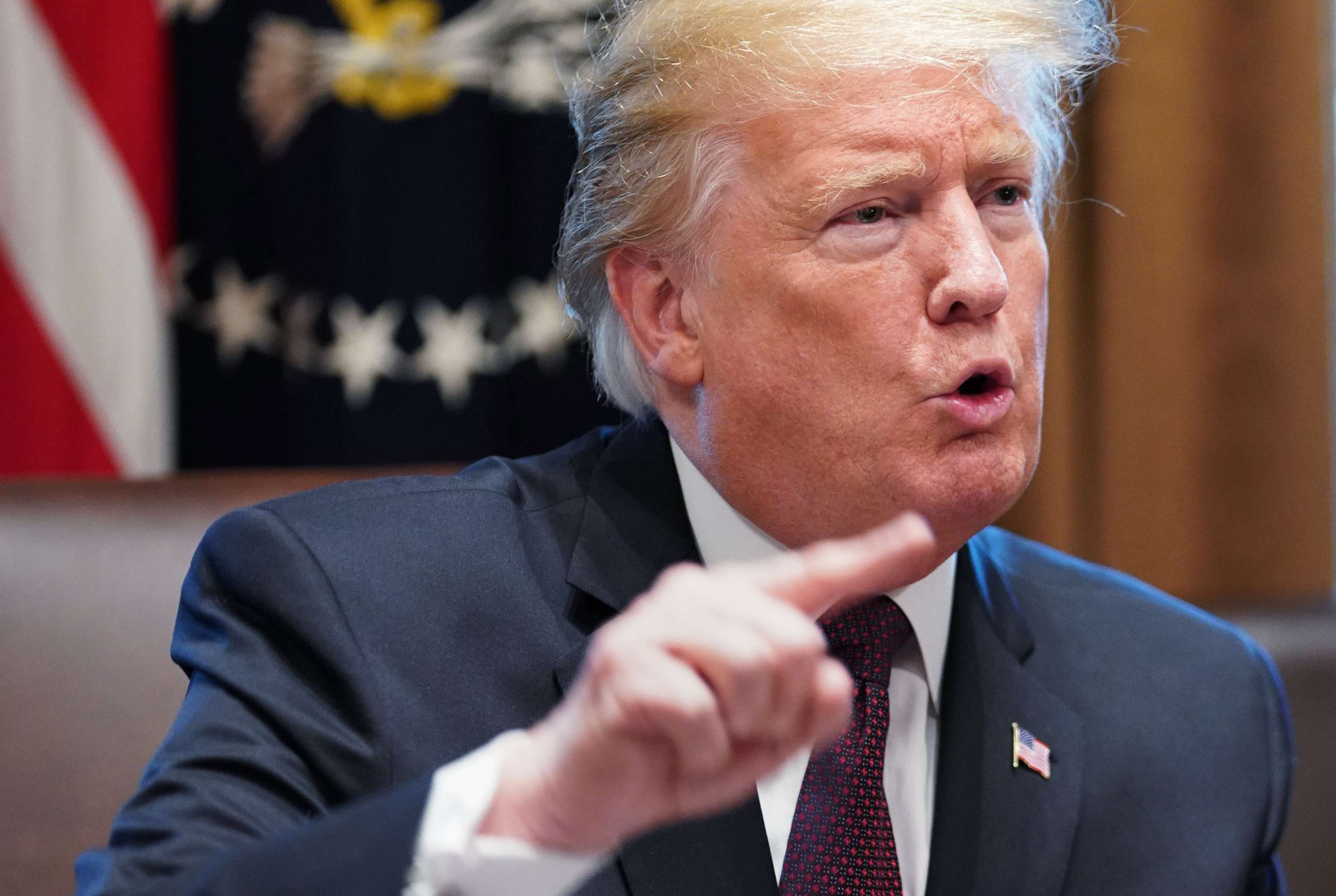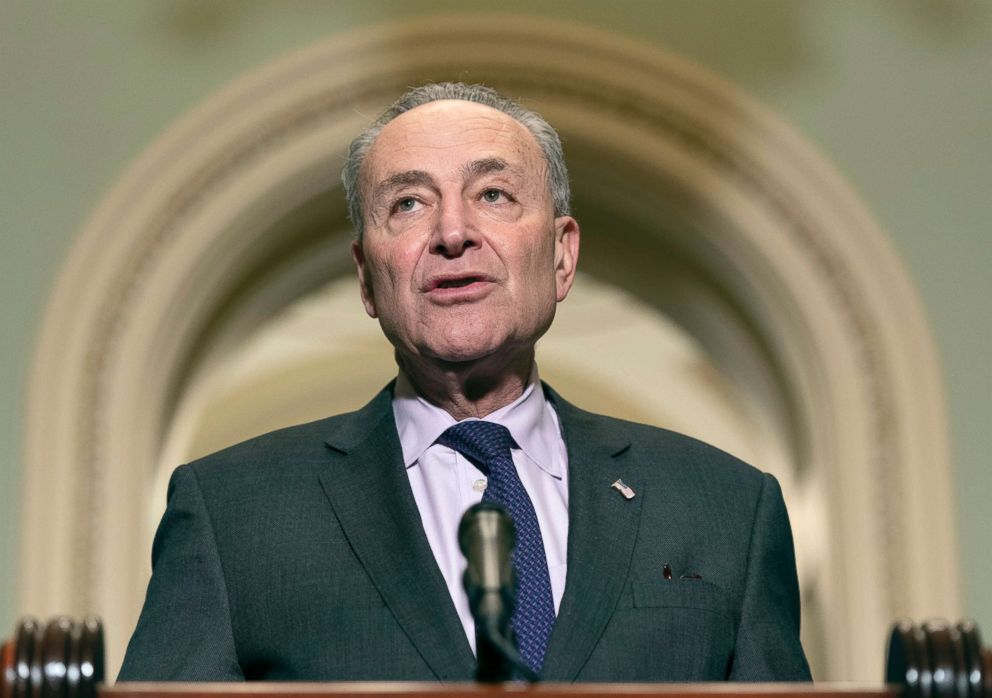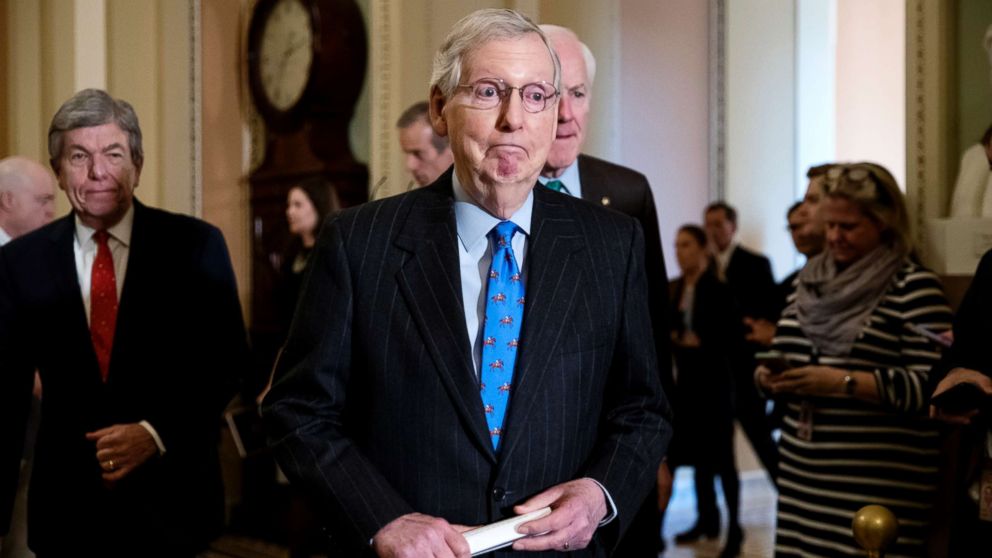Possible short-term compromise brewing on ending shutdown, Trump wants wall 'down payment'
As some of the 800,000 federal workers were poised on Friday to lose their second paycheck amid the longest-ever government shutdown, bipartisan talks about a possible short-term compromise -- a three-week stopgap funding bill to reopen the government -- began late Thursday between Senate Majority Leader Mitch McConnell and Minority Leader Chuck Schumer.
The White House signaled it was open to the idea, but insisted that some sort of money for the border wall President Donald Trump is demanding be included -- something that, so far, Democrats have adamantly opposed.
“Leader Mitch McConnell and Senator Chuck Schumer are meeting now to see whether or not they can work out of the deadlock. As was made clear to Senator Lindsay Graham, the 3 week CR would only work if there is a large down payment on the wall,” White House press secretary Sarah Sanders said in a statement.

Asked if he would support a temporary bill with no wall money, Trump told reporters “I wouldn’t be happy."
“If they come to a reasonable agreement I would support it yes,” he said, according to a pool report.
The new moves to resolve the impasse -- now in Day 34 -- started after two votes in the Senate on two competing measures to reopen the government failed, largely along party lines, although six Republicans broke ranks to support the Democrats’ effort.
On the first measure that encompassed the president’s demand for $5.7 billion for his border wall, along with strict restrictions on the current asylum system and limited protections for so-called Dreamers, senators voted down the measure, 50-47, with two GOP senators, Tom Cotton of Arkansas and Mike Lee of Utah, opposing the bill, while Democratic Sen. Joe Manchin of West Virginia supported it.

The vote on the second measure, a stop-gap bill sponsored by Schumer, that would have funded the government until Feb. 8 with billions in disaster relief but none for a border wall, was supported by all Democrats and six Republicans – Mitt Romney of Utah, Tennessee’s Lamar Alexander, Lisa Murkowski of Alaska, Maine’s Susan Collins, and Cory Gardner of Colorado. The latter two are up for re-election in 2020 in states that Donald Trump lost.
The Coast Guard, in particular, fell victim to the political gridlock and show votes.
Just before the dueling votes, Sen. John Kennedy, a Louisiana Republican, tried to bring up a bill to fund the active duty Coast Guard, the only service not funded during the shutdown. But Schumer objected, trying to get that bill amended with legislation that would have funded the entire federal workforce, including the Coast Guard.
Members shouted past one another, railing against the shutdown, and in one instance, the acrimony got quite personal and heated.
Soft-spoken Democratic Sen. Michael Bennet, in rare form, sometimes shouting, took great exception to GOP Sen. Ted Cruz admonishing his Democratic colleagues, whom he said were for “open borders,” to vote for the Republican bill that contains $5.7 billion for the President’s border wall.
"These crocodile tears that the senator from Texas is crying for first responders are too hard for me to take," Bennet, of Colorado, said. "They're too hard for me to take, because when the senator from Texas shut this government down in 2013, my state was flooded. It was underwater. People were killed. People's houses were destroyed.”
Bennet went on to point out that Cruz was responsible for a shutdown six years ago as he fought to defund Obamacare, sparking that Republican’s ire, adding, "Because of the senator from Texas, this government was shut down, for politics. Then he surfed to a second-place finish in the Iowa caucuses.”
Cruz responded, “I will say, in my time in the Senate, I don't believe I have ever bellowed or yelled at one of my colleagues on the Senate floor, and I hope that in my time before me, I don't ever do that.”
But Cruz continued to point the finger Democrats saying, finally, “OK, we get it. They hate Donald Trump. If anyone had missed that point, that they really, really, really don’t like this man, their yelling and screaming and bellowing has made that abundantly clear, but just because you hate somebody, doesn’t mean you should shut the government down.”
Still, amidst the hand-wringing and back-biting, there was a glimmer of hope that bipartisan talks might be rekindled amidst the failure.
About a dozen senators, six from each side of the aisle, met Wednesday afternoon trying to find a way forward.
“I think we need to find a way to reopen the government,” Sen. Lindsey Graham, R-S.C., who hosted the talks, saying, “We just need a commitment by Speaker Pelosi that she will take up a bipartisan bill passed by the Senate if we show there’s a way to the President’s desk.”
Graham issued a statement saying, "The way forward is clear to me: a three-week continuing resolution (CR) that includes a down payment on wall/barrier funding and priorities of Democrats for disaster relief, showing good faith from both sides. I strongly urge my Democratic colleagues to work with the White House on a three-week CR that includes a down payment on wall/barrier funding consistent with DHS priorities.”
Graham said he had met with Trump on Wednesday, mostly about Syria, but the two discussed the shutdown, as well. “He feels like he has moved and they haven’t, so to get a short–term [funding bill], he would need to see some movement on the [Democrats’] part.”
Sen. Rob Portman, an Ohio Republican, has been in the talks, as well, which he said could number as high as 18 members or even 20, an equal number from each side, adding that the White House has been kept in the loop about what they’re doing.
“We’re not that far apart. This is not health care. This is not a social issue like abortion. This is about how many miles of barrier are going to be on the southern border,” Portman said. “Speaker Pelosi’s new proposal today is a reaffirmation of what the President has said he wants…We’re talking past each other.”
Sen. Roy Blunt of Missouri, a member of Republican leadership, voiced some skepticism about those talks but added that he, too, thinks the two sides aren’t that far apart.
“I don’t think that’s going to produce the result,” Blunt said of the Graham talks, adding that the solution must come from the principal negotiators, the president, the speaker, and the leaders in the Senate.
“They just need to all figure out that they want to end this, and then it ends pretty quickly,” Blunt said. “I think it’s a 45-minute exercise. This is not that hard to do. Everybody knows all the facts.”
“I think the pressure point is that both the president and the speaker need to figure out that they’re losing, and frankly, I think they should both have figured that out by now,” Blunt said.
And with all the partisan sniping that has gone on over the now nearly five-week-long shutdown, the fact that two Republicans are agreeing that the two sides are not far apart, itself, feels like progress.
ABC News' Jordyn Phelps contributed to this report.




